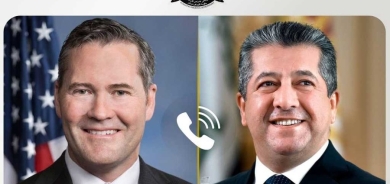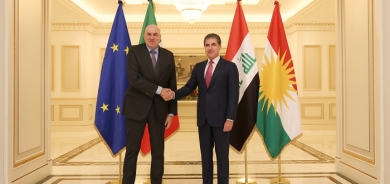Thomas L. Jacobson to Gulan Magazine:In fact; laws are only as good as the democratic system produces and maintains them
February 27, 2012
Exclusive Interviews

The Professor Thomas L. Jacobson is the Director of Center for Public Interest Information at School of Communications and Theater, Temple University. We contacted the Professor Jacobson to discuss The Rule of Law, Governments, Good Governance, and Democracy, and the Professor Jacobson replied to our questions in an exclusive interview to Gulan Magazine as the following:* Sometimes good governance is discussed and believed to be something what humanity deserves in the 21st century. It mean in any society of elected governments doesn't mean to have good governance. So, according to your understanding; what is good governance and how do you define it?
- This has two key components. One is to be responsive to the interests of citizens. This means not only to allow speech but also government must listen and incorporate citizen wishes into action. The other key is to be effective and efficient. Government must respond to often conflicting views. Therefore it must make decisions and lead in making decisions that are effective and fair.
* As the government takes only a part in the governance and should also cooperate and interact with other governance elements like opposition parties, media and public opinion. These elements together can manage good governance. So, how is it possible to make the different elements to interact with each other so as to produce good governance?
- This is a difficult challenge. First it is necessary that political culture understands a fundamental reality, I.e. Politics requires compromise. It is never possible for everybody to get what they want. The best outcome will therefore always be that everybody gets some part of what they want. Citizens must feel they get part of what they want, or they get what they want some of the time. They must also understand that others are in the same boat. The best outcome for the long term is when all interest groups understand that all interest groups are getting something, but nobody is getting everything.
* If we discuss relations between sovereignty of rule of law and democracy, we see that democracy is the product of sovereignty of rule of law, not vice versa. So, how is it possible to develop sovereignty of rule of law so as to consolidate democracy?
- In fact, I believe the relationship between democracy and rule of law is a two-way street. Yes, democracy is not possible without the rule of law. On the other hand, laws are created by the people. Citizens must feel that laws express the collective good, which is a compromise among differing versions of norms and values. Legal theories in the west have traditionally attributed valid law to "natural law" principles. But in fact, laws are only as good as the democratic system produces and maintains them. So law makes democracy possible. But democracy makes law possible also.
* Government should be an active one in the democratic society so as to be at the level of the demands of the people. Usually the danger of gaps between people and the government is discussed and considered very serious. So, according to your view; so as to prevent the creation of any gap between people and government, how the government should function?
- I believe the most useful general principle here is transparency. The more secrecy that exists the more mistrust will exist. When there is lack of transparency citizens will often attribute all kinds of terrible things to government, even when government is acting in a decent manner. Of course, there are good reasons for confidentiality and making deals behind closed doors for certain purposes. But, the goal of transparency is a good general goal.
* Any democratic society needs free mass media and production of serious critics so as to monitor the government closely, certainly having free media for creating critics should be an honest reference. According to your opinion; to what extend democracy development process is endangered when media doesn't release true information?
- In young democracies the main goals must be to encourage media to practice journalism, I.e. Reporting events in a manner that is fair and balanced and as accurately as possible. As you know, there are often great barriers to achieving this often by opposition from government. As democracies mature the picture becomes more complex. In the West there is lots of open and factual reporting. But what is often most important is what is not reported. Commercial news media today in the West are pretty good at reporting the facts. But there is a lot of work needed to report complex stories and to report certain kinds of stories about politics and the business community that are often overlooked.
* The developing countries are in the early beginning of democracy development process and the institutions are not consolidated yet, everything focuses on the characteristics of the prime minister, some experts think that; the much the prime minister believes in democracy the more the democracy development process succeeds. So, to what extend the character of the prime minister is important for the transitional phase and also establishing institutions?
- I am not an expert on parliamentary governments. But I believe the prime minister must model the behavior required in a democratic political culture. He or she must listen to citizens and other stakeholders and take their views into account when fashioning policy. This is leadership by example.
* Another aspect which lies on the shoulder of intellectuals is building up of culture of democracy. So as to have the presence of this culture in the society, democracy shouldn't be narrowed down only into holding elections. So, to what extend development of democracy culture is important for the developing countries?
- As I have indicated above, it is very important indeed. Election booths alone are useless. In my view the chief element of democratic culture is the openness to free speech and the orientation to understanding one another. Political culture's chief value is an orientation to taking one anthers interests into account even while striving to advance your own. It is the value of recognizing, tolerating, and even celebrating difference, and working to figure out how all different viewpoints are valued.
* Last Question: Despite the low rate of GDP in the developing countries and also transition of state economy to market economy, a situation comes about in which the rich get richer and poor becomes poorer. So, how is it possible to maintain market balance so as to allow the increase of individual levels based on free competition?
- Markets are very powerful mechanisms for economic growth. However, I believe the concept of "free competition" is often treated in an over simplistic way. Markets require regulation to keep the playing field balanced for all players. This is why antimonopoly laws are in force in all industrialized democracies. It is why banking needs regulation. It is required to protect other key values such as a clean environment. I think a better term may be "free and fair competition.”















